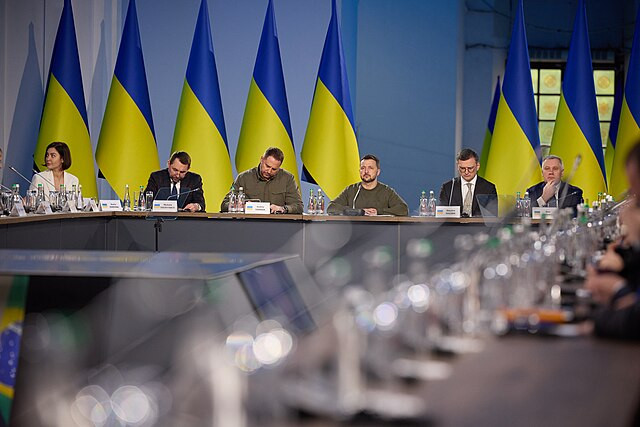A significant peace summit is underway in Switzerland, bringing together representatives from over 100 countries and organizations to discuss a path toward resolving the ongoing conflict between Ukraine and Russia. Notably absent from the gathering are delegations from Moscow and Beijing, highlighting the complexities and challenges ahead.
The summit, held at a resort near Lucerne, features Ukrainian President Volodymyr Zelensky, who is seeking international support for his comprehensive 10-point peace plan first introduced in late 2022. "Everything that will be agreed upon at the summit today will be a part of the peace-making process that we all need," Zelensky stated during a news conference with Swiss President Viola Amherd. "I believe that we will witness history being made here."
Among the attendees are several senior Western officials, including U.S. Vice President Kamala Harris, who is expected to announce an aid package exceeding $1.5 billion to aid in rebuilding Ukraine's infrastructure and addressing humanitarian needs. European leaders from France, Germany, and the UK, as well as Japanese Prime Minister Fumio Kishida, are also present, emphasizing the broad international support for Ukraine.
China's absence stems from its position that any meaningful peace negotiations must include both Russia and Ukraine. Beijing has also floated its own peace proposals in recent months, emphasizing the need for an inclusive international dialogue.
Zelensky's peace plan demands a cessation of hostilities, the restoration of Ukraine's territorial integrity, the withdrawal of Russian troops, and the reestablishment of Ukraine's pre-war borders. It also calls for the creation of a special tribunal to prosecute Russian war crimes. "Ukraine never wanted this war, it's a criminal and absolutely unprovoked aggression of Russia. And the only one who wanted it was Putin," Zelensky emphasized.
However, Russia has shown little interest in these terms. On the eve of the summit, Russian President Vladimir Putin reiterated the Kremlin's demands, which include the withdrawal of Ukrainian troops from four regions that Russia claims to have annexed-Donetsk, Luhansk, Kherson, and Zaporizhzhia-and the abandonment of Ukraine's NATO ambitions.
Putin's recent assertion that nearly 700,000 Russian soldiers are currently deployed in Ukraine underscores the ongoing intensity of the conflict. Zelensky responded by rejecting any notion of ceding territory, likening Putin's demands to those of historical aggressors. "The messages are the same as Hitler's," Zelensky said in an interview. He accused Putin of using the peace summit as a distraction while continuing aggressive military actions.
The Swiss-hosted conference aims to address critical issues such as nuclear safety, humanitarian assistance, the exchange of prisoners of war, and global food security, which has been disrupted by the conflict. While these topics are less contentious than territorial disputes, they are crucial for building a foundation for peace.
Critics argue that the summit's impact will be limited without Russia's participation. The International Crisis Group, an organization dedicated to conflict resolution, noted, "Absent a major surprise on the Bürgenstock, the event is unlikely to deliver much of consequence." However, the conference still provides an opportunity for Ukraine and its allies to emphasize Russia's violations of international law and to rally global support for Ukraine's sovereignty.
Swiss officials hope that Russia will eventually join the peace process. The wording of any outcome document and plans for future actions will be closely scrutinized to gauge the summit's success and the next steps in the peace process. "Most likely, the three items under review will be endorsed by the participants. But then the big question is 'OK, what comes next?'" said Alexander Gabuev, director of the Carnegie Russia Eurasia Center. "And I don't think we have a very clear answer to that question yet."
As world leaders deliberate in Switzerland, the conflict continues to rage. Russian shelling killed at least three civilians and wounded 15 others in Ukraine on Friday, while attacks in Russia's Belgorod region resulted in further casualties. These ongoing hostilities underscore the urgent need for a durable and comprehensive peace agreement, a goal that remains elusive but ever critical.






